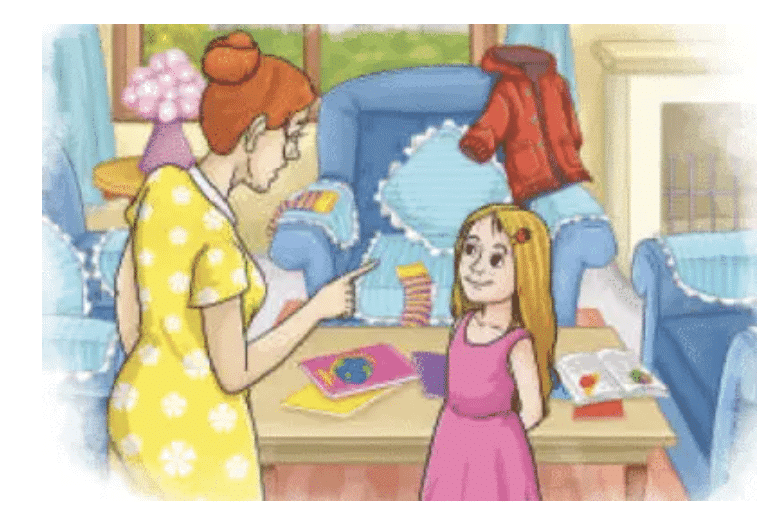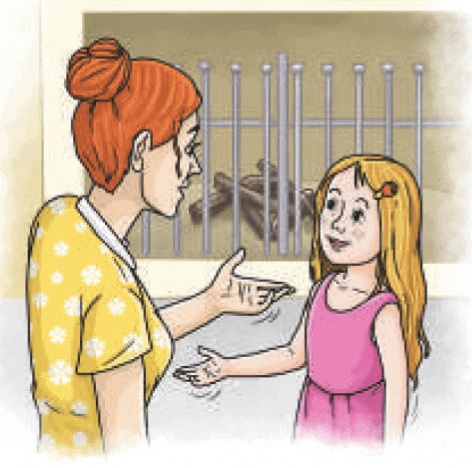Class 7 English Unit 2 Short and Long Answer Questions - Say the Right Thing
Short Answer Questions
Q1: Why does Mrs. Shaw want the house to be tidy for the guests?
Ans: Mrs. Shaw wants the house to be tidy to make a good impression on Mrs. Harding and Mrs. Lee. She asks Mary to put away a coat to keep the room neat, as Mrs. Harding is the wife of a wealthy man, and Mrs. Shaw hopes to become friends with her. A tidy house shows respect and helps create a welcoming atmosphere for the visit.

Q2: What advice does Mrs. Shaw give Mary about talking to guests?
Ans: Mrs. Shaw advises Mary to be kind, say things that make people happy, laugh to keep the mood light, and start conversations if it’s quiet. She also tells Mary to ask guests to stay longer when they want to leave, using phrases like “Must you go? Can’t you stay?” This advice is meant to help Mary be polite and make the guests feel welcome.
Q3: What mistake does Mary make about Mrs. Harding’s children?
Ans: Mary mistakenly compliments Mrs. Harding’s “beautiful children,” saying she saw them on the road. However, Mrs. Harding, looking upset, says she has no children. Mary insists she saw a boy and a girl, making the situation awkward and embarrassing, as her assumption is wrong and upsets Mrs. Harding during the visit.
Q4: How does Mary insult the guests’ hobbies?
Ans: Mary insults the guests’ hobbies by mocking horse riding and shooting, unaware that the Harding family moved to Lanfield for these activities. She also criticises dogs, not knowing Mrs. Harding owns the dog she dislikes. These comments, meant to be casual, offend Mrs. Harding and Mrs. Lee, making the visit uncomfortable and showing Mary’s lack of care in speaking.
Q5: What does Mary say when the guests try to leave?
Ans: When Mrs. Harding and Mrs. Lee prepare to leave, Mary forgets her mother’s advice to politely ask them to stay longer. Instead, she says, “Oh, must you stay? Can’t you go?” This rude remark, the opposite of what she was taught, shocks the guests and ends the visit awkwardly, highlighting her failure to speak thoughtfully.
Long Answer Questions
Q1: How does Mrs. Shaw prepare Mary for the guests’ visit, and why is she hesitant to let her stay?
Ans: Mrs. Shaw prepares Mary for the guests’ visit by teaching her how to be polite and make the guests feel welcome, but she is hesitant because she fears Mary might say the wrong things. She explains that Mrs. Harding is the wife of a wealthy man and Mrs. Lee is his sister, emphasising the importance of making a good impression to build a friendship. Mrs. Shaw instructs Mary to be kind, say things that make people happy, laugh to keep the mood light, start conversations during silences, and ask guests to stay longer with phrases like “Must you go? Can’t you stay?” She also asks Mary to tidy the house, like putting away a coat, to show respect. However, Mrs. Shaw hesitates to let Mary stay because she worries Mary’s tendency to speak without thinking could embarrass them or offend the guests, ruining her chance to connect with Mrs. Harding. Despite Mary’s confidence in her polite phrases like “Good afternoon,” Mrs. Shaw’s caution proves correct when Mary’s blunders upset the guests, highlighting the importance of careful speech in social settings.

Q2: What mistakes does Mary make during the guests’ visit that upset Mrs. Harding and Mrs. Lee?
Ans: Mary makes many mistakes during the guests’ visit, which upset Mrs. Harding and Mrs. Lee and turn the meeting into an uncomfortable mess. First, she compliments Mrs. Harding on her “beautiful children,” not knowing she has none, and insists she saw them, which embarrasses Mrs. Harding. Then, she makes fun of bankers without realising Mrs. Harding’s brother is one, offending her even more. While trying to fix things, Mary ends up insulting their clothes, criticising habits like staying in bed or calling doctors—things the guests themselves do—and saying that women talk too much, only to find out she’s talking about their family. She also complains about dogs, not knowing Mrs. Harding owns the one she dislikes, and makes fun of horse riding and shooting, which the Harding family enjoys. At the end, instead of politely asking them to stay, Mary blurts out, “Oh, must you stay? Can’t you go?” These mistakes happen because Mary doesn’t speak carefully, ignoring her mother’s advice to be kind and thoughtful. Her careless words hurt the guests and teach the lesson that we should think before we speak.
Q3: How does Mary’s final comment to the guests show her failure to follow her mother’s advice?
Ans: Mary’s final comment to the guests, “Oh, must you stay? Can’t you go?” clearly shows that she has not followed her mother’s advice. Instead of being polite and making the guests feel welcome, she says something rude that makes the situation worse. Her mother, Mrs. Shaw, had told her to be kind and use warm words like “Must you go? Can’t you stay?” to show good manners and hospitality. But Mary, feeling embarrassed by all the earlier mistakes she made, says the opposite, as if she wants the guests to leave quickly. This shocks Mrs. Harding and Mrs. Lee, who are already upset because Mary has unknowingly insulted their family, habits, and interests. Her final words make the visit end badly and show that she wasn’t careful with her speech. This moment teaches the main lesson of the play—that we must think before we speak, and always be kind and respectful to others to avoid hurting their feelings.
Q4: Why do Mary’s mistakes during the visit create humour in the play?
Ans: Mary’s mistakes during the visit create humour in the play by being unexpected and clashing with her confident attitude and her mother’s careful guidance. At first, Mary proudly claims she knows how to be polite, using phrases like “Good afternoon,” but things quickly go wrong. She accidentally praises Mrs. Harding’s imaginary children, criticises bankers without knowing Mrs. Harding’s brother is one, and makes fun of things the guests care about—like their clothes, habits, and hobbies. These innocent but awkward comments pile up, making the visit more and more uncomfortable for the guests, which is funny for the audience. The humour increases when Mary complains about a dog, only to find out it belongs to Mrs. Harding, and mocks horse riding and shooting, which the Harding family actually enjoys. The most comical moment comes when she says, “Oh, must you stay? Can’t you go?”—a complete mix-up of the polite phrase her mother told her to say. Mary’s series of well-meaning but badly timed mistakes makes the scene both funny and meaningful, showing that kind words must also be spoken thoughtfully.
Q5: What lessons about polite conversation can we learn from Mary’s mistakes in the play?
Ans: Mary’s mistakes in the play teach us that polite conversation means more than just using nice words—it requires thinking before speaking and being kind and respectful. She makes several careless comments, like saying Mrs. Harding has children (when she doesn’t), insulting bankers (not knowing Mrs. Harding’s brother is one), and mocking hobbies the guests enjoy. These mistakes show how wrong assumptions or careless jokes can upset others, even if we don’t mean to hurt them. Mary forgets her mother’s advice—to speak in a way that makes people happy—and instead makes the visit awkward. Her biggest mistake comes at the end when she mixes up a polite phrase and says, “Must you stay? Can’t you go?”—which sounds rude instead of welcoming. Through humour, the play reminds us that being polite takes effort. We should think about how our words might affect others and try to speak with care and kindness in social situations.
|
55 videos|465 docs|76 tests
|
FAQs on Class 7 English Unit 2 Short and Long Answer Questions - Say the Right Thing
| 1. What are some effective ways to communicate in difficult situations? |  |
| 2. How can I improve my public speaking skills? |  |
| 3. Why is non-verbal communication important? |  |
| 4. What should I do if I feel misunderstood during a conversation? |  |
| 5. How can I build my confidence when speaking to others? |  |






















